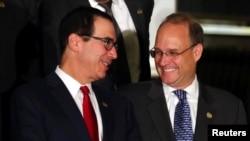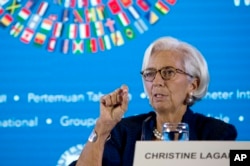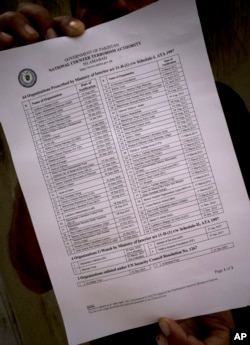A delegation from the Financial Action Task Force (FATF), a global financial watchdog monitoring terror financing and money laundering, has reportedly expressed dissatisfaction with what it called inadequate measures Pakistan has taken to curb terror financing and fix anti-money-laundering laws.
The nine-member delegation of the Asia Pacific Group (APG), an FATF entity that overlooks Asian countries, concluded its 12-day visit to Pakistan on Friday after meeting officials from the country’s ministries of finance and foreign affairs as well as the central bank to assess Pakistan’s progress and compliance with the FATF’s recommendations.
In its report presented to Pakistani authorities Friday, APG reportedly pointed to problems in the country’s legal system and urged Pakistan to address inadequacies in the supervision of nonprofit and charitable organizations.
The APG’s recent findings will also be submitted to the FATF’s main headquarters, which will evaluate Pakistan’s progress and decide whether the country should remain on the FATF’s gray list or be removed next year following measures taken by Pakistan to address the global watchdog’s concerns.
Pakistan was placed on the FATF’s gray list in June over its alleged failure to comply with the global watchdog’s guidelines to crack down on terror financing.
Islamabad was placed on the gray list before, in 2012, where it remained until 2015.
Effects on economy
Some economists in Pakistan fear that the country’s continued failure to satisfy the FATF’s demands could mean the country runs the risk of being moved from the gray list to the black list. They also fear such an action would undermine Pakistan’s fragile economy, which is facing a debt crisis.
“Pakistan’s economy right now is no doubt in a fragile state. Pakistan is seeking help from IMF and fighting to get out of the gray list. If Pakistan remains unsuccessful in satisfying the APG body, there could be consequences, and there are chances the country could be placed on the black list,” Muhammad Zubair Habib, a Karachi-based economist, told VOA.
Earlier this month, Pakistan sought financial assistance from the International Monetary Fund (IMF) to help address some of its economic challenges.
Banking system
Ayub Mehar, another Pakistani economist, told VOA he believes the real problem lies in Pakistan’s banking sector and its existing infrastructure, which has known loopholes that allow militant groups to launder money.
“The team specifically mentioned the flaws in our organized banking system, financial markets, investment in the stock market and the corporate sector. They have pointed towards the lack of enforcement mechanism against the money-laundering and terror-financing channels,” Mehar said.
“Pakistan’s banking system has improved immensely, and one cannot open an account without biometrics and certain verifications,” he said. “But it’s the old bank accounts of individuals and organizations that need to get verified, too, as they were opened before this new system.”
Existing laws
Some analysts, such as Waqar Masood, who once served as Pakistan’s secretary of finance, believe the problem is not a lack of new laws but rather enforcement of existing laws.
“The main problem is not the laws, but the forceful implementation of these existing laws. If Pakistan is serious to get out of the gray list, the country will have to ensure to forcefully implement the laws,” Masood told VOA.
New measures
Over the past year, Pakistan has passed new legislation to combat money laundering and terror financing in an effort to show that Islamabad is taking the FATF’s concerns seriously.
In June, the Securities and Exchange Commission of Pakistan (SECP), the country’s national financial body, introduced the Anti-Money Laundering and Countering Financing of Terrorism Regulations.
SECP also banned individuals and groups placed on terror watch lists by Pakistan and the U.N. Security Council from collecting funds.
The legislation allowed Pakistan to halt the operations of the U.N.- and U.S.-designated terror groups Jamaat-ud-Dawa (JuD) and Falah-e-Insaniat Foundation (FIF), both linked to Hafiz Saeed, who is a U.S.-designated global terrorist accused of orchestrating the 2008 Mumbai terror attacks that killed more than 160 people, including six Americans.
But many analysts accuse Pakistan of being selective in its attention to militants and their financial networks, alleging that Islamabad cracks down on militants that pose a threat to Pakistan while overlooking other groups that operate outside the country. Pakistan has denied such allegations.
Informal channels
Terror financing remains a big challenge in Pakistan. The terror groups allegedly continue to collect large sums of money in the name of religion and welfare for the poor.
The militant outfits also use foreign funding, drug trafficking, extortion from businesses and kidnapping for ransom as ways to generate wealth.
The terror groups also depend on the Hawala system, a parallel banking system, to launder their money, which according to some analysts is not adequately scrutinized by authorities.
“There is no doubt Pakistan has introduced substantial reforms in its banking sector over the past few years. The problem is not the banking system, but the other informal money channels the terror groups continue to use easily,” Pakistani economist Mehar said.
VOA’s Nafisa Hoodhboy and Sarah Hassan contributed to this report.







